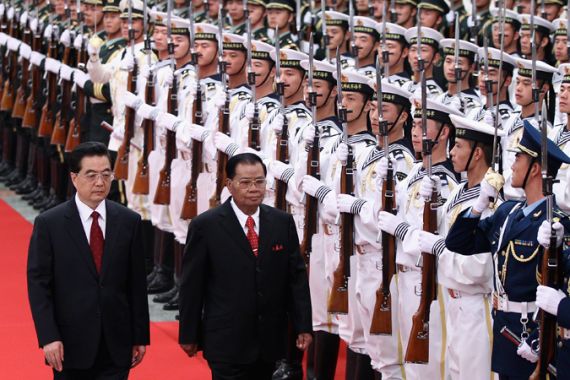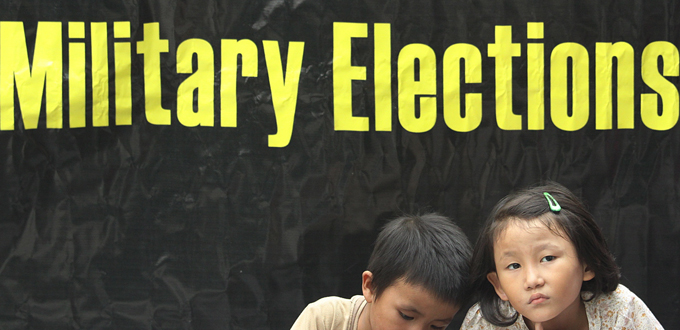A marriage of (in)convenience
The relationship between China and Myanmar may be economically advantageous but is the balance of power shifting?

 |
| Chinese officials have repeatedly tried to convince the Burmese military to embark upon basic economic reforms [EPA] |
Often referred to as “China’s 24th province”, Myanmar shares close ties with the People’s Republic. It is a complex relationship that has been brought into focus by the secretive country’s widely criticised recent elections.
With trade links going back to the 11th century, Myanmar, then called Burma, was one of the first countries to recognise the People’s Republic of China in 1949. Relations turned sour during the 1960s, with anti-Chinese riots and the 1967 storming of China’s embassy in the then capital, Rangoon.
But when Western nations imposed broad sanctions in response to its crackdown on pro-democracy protestors in 1988, Myanmar again looked towards its neighbour. A year later, in the wake of the Tiananmen Square incident, China faced similar sanctions and the relationship was solidified.
Since then, and in spite of international criticism, China has provided crucial diplomatic, military and economic support to Myanmar’s junta. In 2007, it joined Russia in blocking a UN Security Council resolution condemning human rights abuses and the violent crackdown on the pro-democracy, monk-led “Saffron Revolution”.
Non-interference
The international community has tried to pressure China into forcing Myanmar to implement political and social change. “If China won’t change its policies toward Burma on its own, it must be pressured to do so,” wrote Nobel laureate Jody Williams in 2007.
But China has appeared reluctant to interfere, and has now backed elections that have been internationally condemned as a farce designed to legitimise the military regime.
Sean Turnell, an economics professor at Australia’s Macquarie University and the editor of Burma Economic Watch, says Beijing will, however, have made its wishes known to Myanmar’s leaders. “…They do not wish to see any dramas or troubles coming out of these elections.”
“China wants stability above all in Burma. It doesn’t want Burma to become democratic – this might give encouragement to their own restive provinces near Burma – but it does want the country to be stable,” he explains.
Marco Bünte, a senior research fellow at the GIGA Institute of Asian Studies in Hamburg, says: “Officially, China sticks to its policy of non-interference. This is not only motivated by its political tradition, but also because it is better not to take responsibility for other countries and to just benefit economically.”
Beijing is using its mantra of ‘non-interference in other states domestic affairs’ to build political and economic ties with governments that are widely considered ‘rogue states’. Iran, North Korea, Zimbabwe and Sudan often rely on China’s diplomatic support. In return, Beijing attains economic and geostrategic influence.
Exploited resources
With a trade volume of $2.9bn in 2009, China is currently Myanmar’s third-largest trade partner, after Thailand and Singapore, and its biggest foreign investor.
The Chinese are mainly interested in natural resources like coal, oil, natural gas, timber and gems.
State companies like China National Petroleum Corporation or Chinalco have invested more than $10bn in Myanmar – more than 50 per cent of Myanmar’s foreign investment.
During a recent visit to Beijing, Than Shwe, Myanmar’s military leader, signed several agreements on trade, education and health exchanges with the Chinese government, including energy and infrastructure projects.
“Burma is a wonderful source of cheap energy and resources for China. It also is strategically located, offering China a potential outlet to the Indian Ocean, and is something of a buffer with India,” Turnell says.
Myanmar has the world’s 10th-largest natural gas reserves, making it the region’s major natural gas exporter. Currently, 90 per cent of those exports go to Thailand, but as Turnell explains: “China has great economic interests in Burma because the latter has become – and will increasingly become – a significant source of energy and resources.”
Experts estimate that from 2014 China will emerge as Myanmar’s most important trade partner, receiving vast amounts of gas from the resource-rich former British colony. Strategically, China needs Myanmar on its side. With its fast-growing economy, Beijing needs access to its neighbour’s rich oil and natural gas reserves.
With global powers racing to secure natural resources, Myanmar is in a strong position, but human rights groups say that five decades of military rule has seen its ruling generals exploit the country’s natural resources for their own gain while leaving the rest of the population mired in poverty.
A jointly built oil pipeline will go from the Chinese province of Yunnan through Myanmar to a port on the Andaman Sea – supplying part of China’s huge energy needs, while helping to reduce China’s dependence on the Malacca Strait.
About 80 per cent of China’s oil and gas imports currently pass through the narrow and potentially insecure seaway between Malaysia and Indonesia, which is seen as a strategic vulnerability. But from 2013, Chinese oil tankers from Africa and the Middle East will be able to dock at Myanmar’s ports so that the oil can be transported through the new pipelines to landlocked Yunnan.
Ethnic tensions
In recent years, China has not only invested in resource extraction, infrastructure projects and trade with its military-led neighbour. It has also asserted its influence on ethnic Chinese minority groups in Myanmar, gradually undermining the junta’s influence in some regions.
These ethnic and economic ties have given Beijing some degree of leverage, which it has used in the past to get the Burmese regime to comply.
In August 2009, more than 30,000 refugees crossed the border into China’s Yunnan province, fleeing violence after an assault by Myanmar’s army on the Kokang militia, an ethnic Chinese group. Beijing responded by establishing a fact-finding commission of officials who visited ethnic groups in the border region.
“Last year Burma’s regime moved against various ethnic groups with strong links to China, along the border with Yunnan province. Beijing was very unhappy with this, and the regime subsequently postponed these operations,” Turnell says.
“However, they will almost certainly recommence hostilities after the election – so this will be an area of real tension. Beyond this, China’s dominance of Burma’s economy, the extent to which Burma is becoming a vassal state of China, will cause great tensions in the future.”
Western myth
Some experts question this narrative of Chinese power over its neighbour, arguing that with more trade deals and pipelines there comes a degree of dependence and that the tables are already beginning to turn.
Mya Maung, a Sino Burmese analyst, reportedly said China’s influence over the junta appeared to be declining. “China, though it may seem to be the only country with a lot of influence on Burma’s military rulers, are having a tough time with the generals, as they are forced to consider their interest.”
In the 1990s, the UN offered the junta $1bn to hand over control of the country to would-be democratic forces. They refused. For while most of the citizens of Myanmar live below the poverty line, the junta enjoys the profits of oil, natural gas, uranium mining, jade, teak wood, opium and gems.
William Overholt, a senior research fellow at the Harvard Kennedy School, says: “China does not dominate Burma. That is a western myth. Burma has far more trade with India than with China, and its trade with Thailand is a multiple of its trade with China. China has at times called for the Myanmar government to broaden its base – meaning it advocates a less oppressive regime. But it is impossible to think of an area in which China dictates Burmese government policies.
“They actually have very limited leverage, as all foreigners do. China has interests and involvements in Burma, but limited leverage. Burma is not some kind of client state of China. It is a xenophobic, divided, tribalised country with a nationalistic government.
“The whole theory of this government is to cut itself off from the world so no one can influence it.”
Isolation through diversification
|
“China’s dominance of Burma’s economy, the extent to which Burma is becoming a vassal state of China, will cause great tensions in the future.” Sean Turnell |
Myanmar’s leaders have always viewed diversification of their international relations as a crucial element in maintaining power and this limits Beijing’s room for manoeuver.
The cooling of diplomatic relations between China and Burma in 2009 did not affect their economic cooperation. But in Myanmar, distrust of China runs deep, and the junta has for several years tried to reduce its dependence on China by courting other global powers, like India and Russia.
“Many Burmese are deeply hostile to Chinese dominance of the economy, especially in cities such as Mandalay. Burma’s history is full of anti-Chinese riots and the like,” says Turnell.
Even the US, which has banned investments in Myanmar by its citizens, has begun to re-engage with the Southeast Asian country – beginning with Barack Obama’s meeting with Thein Sein, Myanmar’s prime minister, last year. Bünte says the move is a “reply to China’s economic and political rise in the region”.
“The Chinese are following the American engagement suspiciously. But since hardly anything changed in Myanmar’s relations with the US there haven’t been any repercussions so far,” he adds.
Ultimately, the relationship between China and Myanmar is a marriage of convenience – politically inconvenient, but economically advantageous. But as the risks posed by ethnic clashes, rising refugee numbers and the drug trade increase, China may question the value of the relationship.
Overholt explains: “China wants to get along with whoever is governing Burma, as it wants to get along with whoever is governing Thailand. As with its policy towards every other country in the world, it does not try to change the junta, whereas many in the West desire active efforts for regime change.”